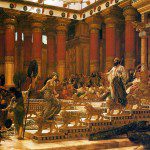![Suitors of Penelope by John William Waterhouse [Public domain], via Wikimedia Commons](https://wp-media.patheos.com/blogs/sites/637/2016/09/JohnWilliamWaterhouse-PenelopeandtheSuitors1912-300x204.jpg)
We are moved by the great love stories which reflect the trials and tribulations of love, and in them, whether we realize it or not, our relationship with God is often being represented. From the tale of the Odysseus and his struggle to return home to is love, Penelope, to Psyche and Cupid, to Majnun and Layla, and into modern literature with stories like that of Beren and Lúthien, we can recognize the glory of human love but also what lies behind it, the love between God and humanity, and the great difficulty which is to be had for that love to be realized.
Humans are made in the image and likeness of God, and so in and through our great tales, we can learn something not only of ourselves but also of God. Yes, the image has been defaced due to sin, and so our stories need to be examined in order to properly see the truth of God behind them, but behind all the imperfections, there is much for us to discern. The religious character of such tales is recognized by mystics throughout the world, from differing religious traditions, indicates the universal truth about love and its importance for our relationship with God. This means people all around the world have something to offer and share with each other despite the differences of their religious beliefs. We can share our stories and be affected by them, grow in understanding not only of the notion of love and the trials and tribulations great loves face, but also in our understanding of what true love for God entails. We can glorify God with each other, even if we do not entirely come to religious agreement, because we are capable of communicating about God with a common language: the language of love. Certainly this does not mean we only appreciate the stories because of their religious content, but rather, we also enjoy them for their literary merit, which often is the first thing which gets our attention, and only later do we reflect upon them and realize the higher truths which can be discerned through them. Indeed, once we explore them, we learn that these higher truths provide some of the elements which make such stories attractive (even if we are not aware of their influence in our basic enjoyment of such tales).
The great mystics of the world, moved by such love, therefore are capable of speaking to each other with and of that love. This is not to say they are equal in attainment, that their loves are equal in purity or depth – but yet, they express what they feel at the core of their being, and produce great works of literary art which other mystics can understand and other readers appreciate for the sheer beauty of the work. When they are so tied up with that love, all that they say and do is experienced in the light of that love, and is therefore an expression of that love, even if it comes out in a form which for us, might not be so easily discerned to be about God.
It was in this manner that Abu al-Hasan al-Shushtari was able to take the story of the love of Majnun and Layla and show its universal significance to us: we are all Majnun seeking Layla, and in the quiet of that love, all things are Layla, all things manifest and show Layla to us, the glory of God:
There is no life but Layla,
When in doubt ask everything about her.Her mystery emanates in everything
and because of that everything praises her.Her beauty is widespread, its fullness, concealed:
The witness says:She is like the sun, its light radiant,
yet when you seek for it, it turns to shadow.She is like the mirror in which images appear
reflected, yet nothing resides there.She is like the eye which has no color
yet in it appears colors in every hue.[1]
The beauty of the beloved reflects the beauty and glory of God. We see in our beloved the work of God in our lives. True love for another which unites us with them does not become idolatry if we see and understand it in relation to our love for God, seeing such earthly love works with and participates in our greater love for God. The key is to see God at work in that love, and to see our love for the other also manifests our love for God. The two need to go hand in hand; then we can cry out with words which indicate we want to give all praise our beloved and have others share in that praise because they also see our beloved in their beloved, our beloved being God who is manifest in all true love.
We can find this sentimental also reflected in the “Songs of Reflection,” written Mesoamerican Nahuatl sages, where the flowers which enrapture man are seen to come only from the heavens:
Our priests, I ask of you:
From whence come the flowers that enrapture man?
The songs that intoxicate, the lovely songs?Only from His home do they come, from the innermost part of heaven,
only from there comes the myriads of flowers…[2]
We are to find the glory of God manifested in our life, drawing us to that glory through love, a love which unites us with our beloved and in that unity, to God. For some, the mediation is more direct, and so the relationship between them and God is more direct, having less to do with earthly cares which they have abandoned. Nonetheless, even those ascetics can appreciate the way God comes to those who engage in love and find God in that love. We are all called to God. We all have in our soul a love and desire for God, and in that love we search for and come to see the God who is love in many ways. Yet, God is himself constantly granting us the gifts of his love. He has bestowed upon all the call to union with him, the betrothal gift of life, which then allows us to declare our love for him and to receive in return an even greater gift, the special gift associated with the second birth, as Hugh of St Victor indicated:
There is no soul who has not received the betrothal-gift (arram) of this Bridegroom. But one kind of betrothal-gift is common, another kind is special. It is a common betrothal-gift that we have been born, that we have sensation, that we know, and that we discriminate. It is a special betrothal-gift that we are reborn, that we have attained remission of sins, that we have received gifts (carismata) of virtues. What each one has is his betrothal-gift. [3]
It is, therefore, in the greatness of love all of our questions find themselves silenced. All negative theology must be seen in the light of love, so that through love, they open ourselves up to the revelation of love itself, lest, as Balthasar explained, we turn inward and away from the truth and enter into the dangerous territory of nihilism with its atheism and destruction of being:
The majesty of absolute Love that approaches man in revelation goes out to meet him, invites him, and elevates him to an inconceivable intimacy. It allows the finite spirit to understand for the first time what it really means to say that God is the Wholly-Other, that he is “in reality and in essence, distinct from the world, supremely happy in himself and from himself, and inexpressibly loftier than anything besides himself which either exists or can be imagine” (Vat. I, ss. 3., c.1). Apart from this revelation of love, all negative theology remains so empty that it is in immediate danger of drifting either into atheism (or agnosticism) or a philosophy (or mysticism) of identity. [4]
![Rumi By Molavi (Masnavi Manavi Molavi) [Public domain], via Wikimedia Commons](https://wp-media.patheos.com/blogs/sites/637/2016/09/Molana-300x296.jpg)
Love is for vanishing into the sky. The mind,
for learning what men have done and tried to do.
Mysteries are not to be solved. The eye goes blind
When it only wants to see why.[5]
We drink from the love which has been made within us, purifying waters turned into the wine of great delight. Our art, therefore, our being, is to be manifest in this love, as al-Shushtari put it well:
Loving the beautiful one, my friend, is my art
and I drink from my own jug.[6]
More To Come
[1] Abu al-Hasan al-Shushtari, “Layla” in Songs of Love and Devotion. trans. Lourdes Maria Alvarez (New York: Paulist Press, 1999), 54.
[2] Icnocuicatl, “Songs of Reflection” in Native Mesoamerican Spirituality. ed. Miguel León Portilla. trans. Miguel León Portilla et. al. (New York: Paulist Press, 1980), 204.
[3] Hugh of St Victor, “The Praise of the Bridegroom,” in Victorine Texts in Translation: On Love. trans. Hugh Feiss OSB (Hyde Park, NY: New City Press, 2012),125-6.
[4] Hans Urs von Balthasar, Love Alone is Credible. trans. D.C. Schindler (San Francisco: Ignatius, 2004), 57-8.
[5] Rumi, The Essential Rumi. trans. Coleman Barks et. al. (New York: Quality Paperbacks Book Club, 1995). 107 [From the section, Being a Lover].
[6] Abu al-Hasan al-Shushtari, “Robbed of my senses” in Songs of Love and Devotion. trans. Lourdes Maria Alvarez (New York: Paulist Press, 1999),61.
Stay in touch! Like A Little Bit of Nothing on Facebook:
A Little Bit of Nothing













